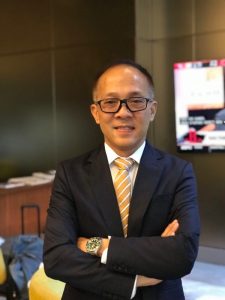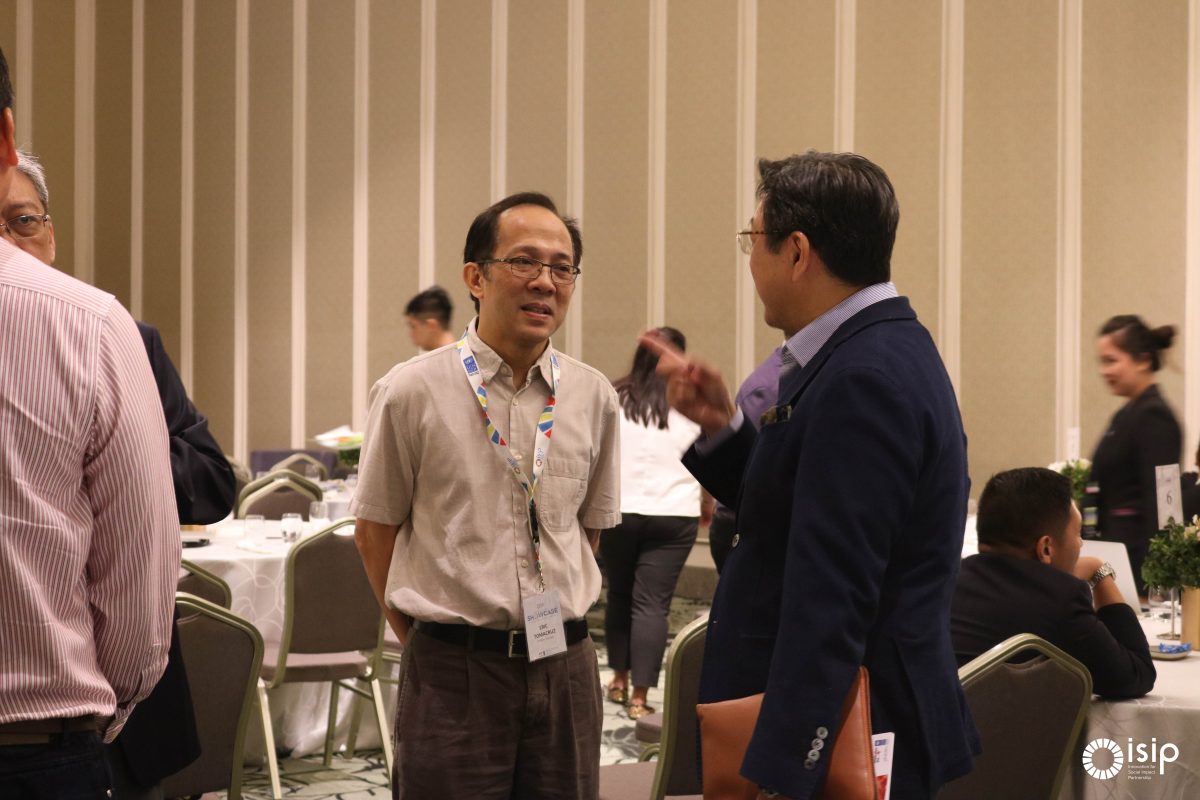by Adriel Nisperos
“I was shopping at Powerplant Mall, and then by accident, I saw Dado Banatao. We know each other from Silicon Valley, and so I said hello. I had heard about PhilDev, and so I said, “Dado, if there’s anything I can do to help PhilDev, just let me know.” I had no idea I’d become a trustee, soon after, and now I’m the Executive Vice-Chairman. That’s how it came to be.”
 Who would have thought that a simple “hello” to a former colleague could be a doorstep to creating a more significant impact? That’s precisely how the first chapter of Dr. Eric Tomacruz’s story with PhilDev started.
Who would have thought that a simple “hello” to a former colleague could be a doorstep to creating a more significant impact? That’s precisely how the first chapter of Dr. Eric Tomacruz’s story with PhilDev started.
Dr. Tomacruz (or simply “Eric” as we call him at PhilDev) is a STEAM graduate, completing his undergraduate and graduate degrees in Electrical Engineering at the University of California Berkeley (UC Berkeley). Entrepreneurship was embedded in his career early on, working in two startups at Silicon Valley at the dawn of the Internet revolution. Years after solidifying his knowledge and gaining much experience, he flew back to the Philippines to start his own company. Today he sits as the Founder and CEO of Findshare, a white-labeled cashback and rewards program platform provider in the Philippines that leverages big data analytics.
In our brief chat with Eric, he shared what it’s like working with PhilDev as our Executive Vice-Chairman and his insights on the country’s current education, innovation, and entrepreneurship landscapes.
Can you tell us more about your experience in your industry and how it contributes to the goals of PhilDev?
Since the time I moved back to the Philippines in the late 1990s, I’ve always been doing entrepreneurial work such as starting my own company, creating different things, some are succeeding, some are failing — failing miserably right? But that brings me to my point- that I’m happy to be part of PhilDev because if you look at the core pillars of PhilDev, we eradicate poverty through innovation, education, and entrepreneurship. And all those three, I love school, I love to innovate, and I’m very entrepreneurial, so it’s a perfect match if you ask me. I hope people at PhilDev feel the same way.
And I’m happy that I can be a good mentor and be a good judge at PhilDev events. I believe an organization like PhilDev will best utilize my expertise in helping the Filipino community.
Based on your observations, what do you think about the education system in the Philippines?
I’m very impressed with the graduates, specifically from the top universities in the country. In fact, they are kind of hard to hire because they are so much in demand right? In terms of how I feel the education system can be improved, there are several things. One is more diversity. Diversity can happen in different ways when exposed to people from other countries, whether students or a visiting faculty, because that always helps bring diversity.
I also think, coming from UC Berkeley, where my engineering professors are always part of companies, that I see the relevance of what they teach when they say, “you get to apply this when you go out in the real world.” So I would also recommend, specifically for teachers in the science and engineering field, that they don’t just do pure teaching. If you can do a consulting job related to what you’re teaching, you should do that because it can enhance what you teach further and give more meaning to your students.
Another thing I noticed in the Philippine grading system is you’re not graded on the [bell] curve. Usually, you’re graded on the whim of the professor. Unlike in the United States, everyone is graded on the curve. So when you get a resumé in the US and somebody says, “I got an A’s in a row,” that means a lot. I know the person is capable. Unlike here in the Philippines, when I get a resumé that says “I got all C’s,” that doesn’t mean they’re not capable; they must have taken a hard professor, right? So it’s hard to gauge based on grades. In the end, people don’t use grades as the basis for hiring anymore. Why grade them if you’re not going to ask their GPA and use it as a measure for something? That should be changed in the education system in the Philippines.
Another thing I see for the less competitive schools is that I get the impression that they’re focused on keeping students because of financial reasons, so you get many of these computer science graduates that I wouldn’t consider as software engineers. And maybe the solution for this problem would be to regulate it more. Instead of some schools sometimes being like diploma mills, just putting “computer science” in their forms… I think it’s very embarrassing for our country. When they go abroad and apply for a computer science job, [companies] realize, “Hey, this person cannot really program.” So now they equate graduates from the Philippines that way.
How do you think we can encourage more science and engineering students to pursue entrepreneurship?
We should have more Dado Banatao’s as an example. Let me give you a background. When I went to college in the 1980s, there was no technopreneurship course. But everyone already had the mindset of starting their own company without being taught to create a startup. And the reason for that was we had all these role models to follow, Steve Jobs, and Bill Gates for example. By that fact alone, our mindsets became ready to go in that direction.
It’s great if you’re educated. But first and foremost, we must have examples of people succeeding from the Philippines. And that’s what I feel we lack a lot. I hope that PhilDev could be instrumental in helping a company here in the Philippines be the next unicorn. And when this is publicized, we’ll have tons of students inspired to be the next generation of entrepreneurs. I think that’s what we all need. We already have the education in place. We just need the success stories.
What piece of advice can you give to new graduates especially in navigating work life in the midst of a pandemic?
When you graduate, you’re going to have to make a decision. “Do I want a safe job at a multinational [company] that will pay right away?” I think that’s also a big problem in the Philippines. I can’t blame them if finance is really the primary concern and, say, they also have to help in the finances of their family. But if you can afford to risk it and start a new company that may or may not work, I encourage people to go ahead and do that.
I’m also unhappy that if you look at the top brands in the Philippines, you can see Grab, Lazada, Shopee, Jobstreet. They’re all startups that came from other Southeast Asian countries and not the Philippines. So I’m wondering why is the Philippines not producing these? It looks like they have a more entrepreneurial mind than people here, and I hope that mindset will change. I hope to have more examples of these success stories that we can export to other Southeast Asian countries and not the other way around.
In terms of the pandemic, there are always opportunities to learn with change, and the pandemic has been changing a lot from the way we shop to the way we want to work. And when you think about all these changes, I think it’s really ripe for new startups to flourish. That’s when all these companies were formed… because of all these changes. Like when the Internet came about, suddenly you have many new companies because there were so many things that can be done. And with the pandemic, again, it’s a significant change for a lot of things we do. From that point, I think it’s a good time to think of new ways to build new companies.
What do you think about the quality of innovations produced in the Philippines? Can you also share your observations based on the outputs you saw during our innovation challenges?
To be honest, it’s improving, but we’re still not matching people in Silicon Valley. I think we’re still behind other Southeast Asian countries too, like if you look at pitches in Singapore. We need to be exposed further on that and hopefully come up with more thought-out pitches and solve better problems. Hopefully, PhilDev could be instrumental in helping people come up with those better pitches and better problems to be solved. And hopefully, around the corner, a very successful startup.
How do you envision the Philippines 10 years from now?
I can talk about our next project, the Jumpstart Program, where we link large companies and conglomerates with startups. And as I’ve mentioned before, I think PhilDev has been doing a great job with education. Now it’s time to come up with more Dado Banatao’s right? We need to produce that, and I think that’s the ultimate measure of success if we can be part of the journey of that company or companies. And I feel a good way to go about that is when you have large corporations working with startups, the startups can preview the challenging problems that large corporations are dealing with. And if they can solve that, they will have clients right away. One of the beauties of working with large corporations is that they will tell you what their pain points are. This will give startups the right challenging problems to solve. And if they can solve this, the chances are that solution can be exported abroad. It’s always tough when you have a startup that has a solution looking for a problem. You always want to start with a proper problem and find a solution to increase your chances of success. And that’s one of the key things about the Jumpstart program. And by working with large corporations, you will also be mentored by them, given the right resources, and probably even quickly market to their clients if you’re able to come up with the right solution.
What does success for PhilDev look like to you?
Like I said earlier, hopefully the Jumpstart program will help create the next Dado Banatao. And if we’re able to create this successful company, our chances are they’ll employ tens of thousands of people or maybe even hundreds of thousands of people. And ultimately, that will reduce poverty in the country, which is the primary purpose of PhilDev. So that is the vision and hopefully, in the next decade, we can be almost a first-world [country] by achieving this innovation-entrepreneurship experiment. I think that’s the way out of poverty for the Philippines.
